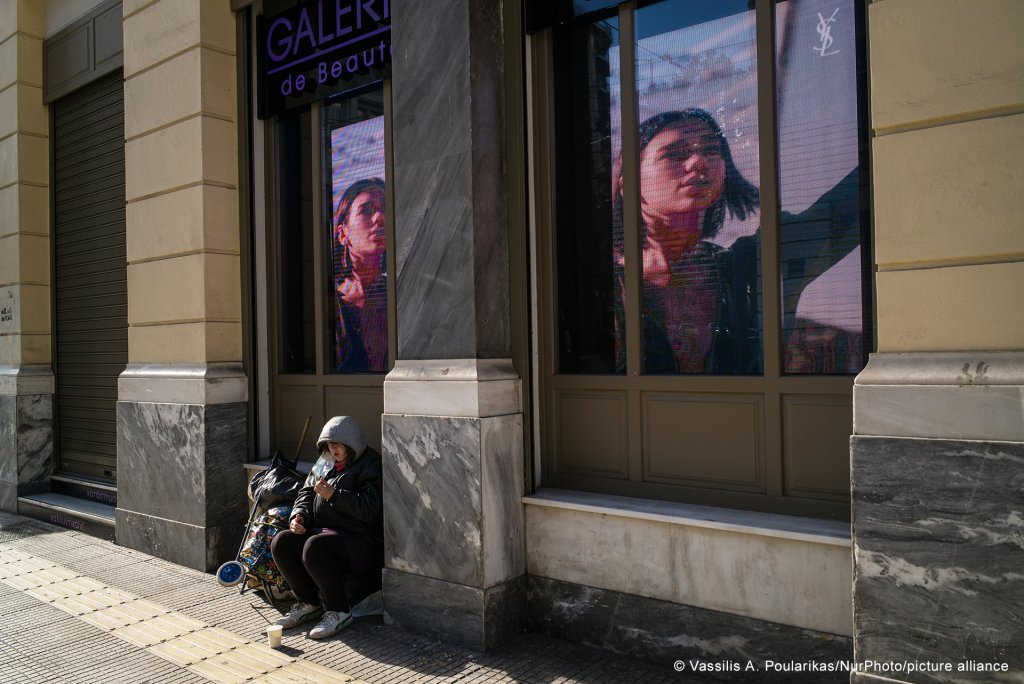Germany's Federal Administrative Court has issued a decision saying that the deportation of two asylum seekers from Germany to Greece under the EU’s Dublin Regulation is permissible. This follows a series of similar rulings in recent months. Several politicians have welcomed the ruling, while refugee rights groups have expressed grave concern.
The top court in Leipzig, Germany's Federal Administrative Court, has ruled in a case that involved two men with different nationalities and backgrounds, who had initially submitted asylum requests in Greece, which were approved there.
However, the two men later made their way to Germany, where they lodged additional asylum applications.
These were rejected on the grounds that they had already been granted asylum in an EU country. Under the bloc's Dublin Regulation, asylum seekers are expected to apply for protection in the first country they arrive in, leaving the ultimate responsibility of care for them with that country.
The two men, who had left their home countries in 2017 and 2018, respectively, appealed against the decision, which was then initially presented to an appeals court in Kassel in the federal state of Hesse.

That court declared that even though the Greek asylum system does have certain shortcomings, as two healthy and single young men the two plaintiffs should not face any inhuman or degrading treatment in Greece that would require them to be kept in Germany's care.
In a final instance, that same decision has now also been upheld by the Federal Administrative Court in Leipzig.
Read AlsoGermany wants asylum seekers already recognized in Greece to consider return
'Bed, bread and soap' — enough to get by
The two men had argued throughout the whole procedure that asylum seekers in Greece face significant hardship. In particular, they had highlighted that the Greek government provides little financial support to approved asylum seekers and leaves them to fend for themselves.
When the case was presented to the Federal Administrative Court, it had to determine the veracity of this claim.
It examined the overall realities that the two men — a 32-year-old Somali national and a a 34-year-old man from the Palestinian Territories who is reportedly stateless — would face living in Greece, taking their exact circumstances into account.
This included an assessment of their age, overall physical health, marital status as single men, and likelihood of finding gainful employment.

The court ruled that the two can be sent back to Greece, as it was unlikely that they would suffer considerable hardship beyond what legally is admissible.
Presiding judge Robert Keller said that asylum seekers in Greece had "bread, bed and soap" at their disposal, conceding that "[t]his is not much. We know that."
Nevertheless, the court concluded that Greece does not violate the EU Charter of Fundamental Rights in its treatment of asylum seekers.
Read AlsoGreek NGO warns staff lacking in migrant centers
A new threat to stateless people
The decision can be used as case law in future in instances that bear close resemblance to the circumstances presented in this case — although it is unclear whether any other cases of a similar nature would have to be based on the same nationalities, i.e. Somalian and stateless.
Perhaps the most noteworthy aspect of this decision by the Federal Administrative Court is the fact that even in the case of a stateless person, the court decided that the responsibility of care could be deferred back to Greece under the Dublin Regulation.
Legally, the decision could be extended and applied to other stateless people as well, going beyond the Palestinian Territories specifically.
Historically, stateless individuals in Germany have generally enjoyed greater leniency overall in asylum-related decisions.
Read AlsoGerman government sees 'progress' in talks with Greece about migrant returns
Continuing trend of dismissing Dublin cases
Last week, the Federal Constitutional Court already dismissed a similar appeal by a man against his deportation to Greece, saying the evidence presented in the case was inadmissible.
In comparable cases presented last year, the top court in Leipzig already issued decisions saying that deporting people to Italy under similar circumstances was also permissible.
However, the ruling nevertheless contradicts a number of decisions issued by various other courts, which have sided with the view that the situation for asylum seekers Greece can be regarded as below par.
Due to the high volume of such decisions, deportation flights from Germany to Greece have largely actually stalled in recent years.
Broadly speaking, despite a long backlog of tens of thousands of Dublin cases due to be deported back to their EU country of first entry, few are ever actually sent back to those countries for various reasons.
In fact, there are even thousands of cases, where people are later returned back to Germany after previously being deported under Dublin rules.
Thousands of asylum seekers fear return to Greece
Various refugee organizations already criticized earlier decisions in the current case, claiming that the conditions of the Greek asylum system were undignified, while also calling for a ban on deportations from Germany to Greece.
The German asylum rights group Pro Asyl said that even people who are recognized as rightful asylum seekers can often end up homeless in Greece, as they receive little — if any — state support.
Pro Asyl Managing Director Karl Kopp even accused the Greek government of pursuing a deliberate "policy of impoverishment."
"This is unworthy of an EU country," Kopp said in the run-up to the ruling in Leipzig on Wednesday (April 16).
According to Pro Asyl, about 25,000 people who had previously been recognized as refugees in Greece applied for asylum in Germany in 2024 alone.
Read AlsoGreece plays 'a crucial role' in Europe's asylum reform success: German minister
Winds of change in German politics
However, various senior politicians in Germany meanwhile welcomed the ruling.
"This ruling is groundbreaking because it restores the basic principles of cooperation in asylum matters in Europe," Hesse's Minister for European Affairs Manfred Pentz from the Christian Democrats (CDU) told the Bild daily newspaper.
He further emphasised that the majority of asylum seekers coming to Germany arrive from another EU member state.
Saxony's Interior Minister Armin Schuster, also a Christian Democrat, told Bild that with the court ruling, "(t)he alleged concern about violated human rights [in Greece] has thus finally been exposed as a political obstructionist tactic."
"[O]ne would have to be surprised if even EU members no longer met the standards in a common asylum system," he told the newspaper.

Meanwhile at the federal government level, CDU interior affairs delegate Christoph de Vries referred to the ruling as a "real game changer in terms of migration policy," adding that in his view the decision meant that it would now once again be possible to return refugees to Greece, "which could curb illegal internal migration within the EU and asylum abuse in Germany."
Following the last federal elections held in February, the Christian Democrats were given the mandate to form a new government; along with their coalition partners, the social democratic SPD party. They are about to start ruling at the federal level next month, with a focus on reducing immigration rates.
Read AlsoGermany: Merz says incoming government plans to keep new asylum cases under 100,000
with AFP, KNA, EPD, dpa
